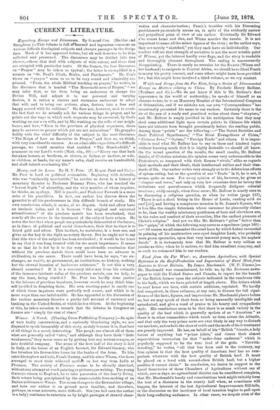Waifs and Strays from the Far East, being a Series
of Disconnected Essays on Matters relating to China. By Frederic Henry Balfour. (Ti iihnor and Co )—We do not know if this is Mr. Balfour's first appearance in the world of authorship ; he speaks of himself as an obscure wilier, he is an Honorary Member of the International Congress of Orientalists, and if we mistake not, our own " Correspondence " has occasionally presented his name to our readers. Certainly there is the air of the pen of a ready and practised writer about these " chapters," and Mr. Balfour is amply justified in his anticipation that they may shed some additional light upon certain points in Chinese life which have not hitherto been brought prominently before the reading public. Among these " points " are the following :—" The Secret Societies and their Political Significance," "The Rival Evangelisers of China," " Chinese Jews," " Opium," "Foreign Trade" and others. It is impos- sible to read what Mr. Balfour has to say on these and kindred topics without learning much that it is highly desirable we should all know. On the vexed question of the results, the small results, Mr. Balfour thinks, of Christian missions, his opinion seems very unfavourable to the Protestants, as compared with their• Roman "rivals," alike as regards their methods and their ideals, their intellectual calibre and their stan- dards of life. Our author writes very strongly as to the deleterious effects of opium-eating, but on the question of our "Trade " in it, he is not, it seems, quite so sure. For every opinion of his, however, he gives us " chapter and verse," and only on very few occasions does he betray the irritations and querulousness which frequently disfigure colonial treatises ; oddly enough, when these occur, Mr•. Balfour is nearly sure to be discussing a religious question, as when he writes (page 1l5), "There is not a sleek bishop in the House of Lords, ranking with an earl [sic], and having a sumptuous mansion in St. James's Square, who is less like the simple fishermen whose successor he pleasantly claims to be, than the worthy missionary gentlemen of here and elsewhere are, in the rules and conduct of their avocation, like the earliest pioneers of Christ's religion." And yet we like Mr. Balfour's " gibes " better than his "quips," of which the following may serve as a specimen (page 160) : —" Of course we all remember the creel hoax by which Labatt succeeded in palming off his unattractive sore-eyed daughter Leah, who probably wore green spectacles, upon that very innocent young man, his nephew Jacob." It is fortunately true that Mr. Balfour is very seldom as jocular as this; when he is serious, we find him excellent company, and as such we commend him to our readers.


































 Previous page
Previous page